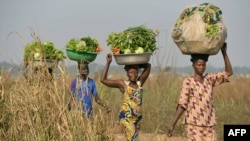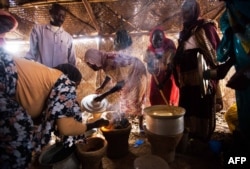International Women's Day — March 8 — is a day the United Nations and non-governmental organizations dedicated to celebrating women's political, economic and social progress.
Many of these efforts are included in the 17 Sustainable Development Goals adopted by member countries of the United Nations — goals that involve gender equality and the empowerment of women.
SDGs were intended to build on the UN's eight Millennium Development Goals, which ended in 2015. Those goals aimed to improve social and economic conditions in poor countries by reducing poverty and hunger; promoting health and education, especially of women and children; and curbing malaria, HIV and other diseases.
The 17 SDGs — which end in 2030 — take those efforts further. They include the unfinished business of the MDGs and add other initiatives, such as coping with climate change; promoting clean water and sanitation; and promoting living standards, sustainable cities, innovation and economic growth.
UN officials say the SDGs attempt to include the needs of marginalized groups the world over, including women. For example, Goal 11 supports sustainable cities — and includes efforts to make urban areas safe for women.
Providing safe cities could mean the difference between life and death for women and girls, the UN says, as good roads and safe public transportation are crucial for mothers and children needing quick access to medical clinics.
Ripple of benefits
Diana Ofwona, Regional Director for West and Central Africa, stresses that connectivity of society. Advancements such as improving public infrastructure and passing legislation that enhances women's rights in turn transform the lives of women and, by extension, their families and the economy as a whole, she says.
“We have found through our Safe Cities Program that when we sensitized government authorities such as mayors and city planners for better lighting and infrastructure, and security organs to provide safe and secure spaces for women survivors of sexual- and gender-based violence, it ensured the security of our women and girls,” said Ofwona, who is also Acting Director for Eastern and Southern Africa for UN Women.
Role for women
The SDGs also contain indicators that ensure that women have a role in disaster management and relief efforts.
According to U.N. statistics, natural disasters kill more women than men — and at earlier ages than men. In addition, female survivors have few options to recover from floods or earthquakes.
U.N. statistics also show that women often make up the majority of displaced and refugee populations.
Ofwona stresses the importance of including women's views in all post-disaster and reconstruction efforts — including in camp management, which is usually left to the men. In one instance, she says a camp management team had not taken into account that breast-feeding mothers need a special diet. After a week, mothers had no more breast milk for their infants, causing stress, anxiety and hunger-related ailments to both the children and mothers.
In addition, she says, water at the camp was running low — and mothers had problems nourishing themselves and their children.
“The worst part of it was the food they were getting was maize and beans,” Ofwona said. “For lactating mothers, you need … milk, porridge, clean water, fruit. … So, the women were not able to lactate and there was no water. When we visited the camps, the babies were crying incessantly … and we asked the camp managers what was the problem — and they said they did not understand.”
Had women been included in the camp management team, Ofwona says, the problem probably would have been identified earlier in the process.
Politics and women
The SDGs also promote women's participation and leadership in politics. In some countries, UN Women has supported advocacy efforts for quotas. It has also trained female candidates in parliamentary caucusing, confidence building, and debating skills so they can better advocate for pro-women legislation in elections.
UN Women has also supported Women's Situation Rooms in Liberia, Sierra Leone, Senegal, Nigeria and, more recently, Uganda.
Such spaces allow prominent women from different African countries to meet with government officials, political parties, electoral candidates, women's groups and civil society. They also help to broker peace and consensus in deadlocks, preempt potential violence or conflict, and provide for the participation and safety of women voters and candidates.
“Women's Situation Rooms [WSRs] are a physical space with a 24-hour call center usually managed by youth volunteers — girls and women,” Ofwona said. “[They] receive reports on a minute-by-minute basis from all districts and counties that have been identified as hot spots. The WSRs also do an analysis of the political situation before, after and during the election.”
Ofwona credits such spaces with helping to avert crises, cooling tempers and brokering peace between warring factions.
Women's support groups say it's just one example of the benefits of promoting women in all spheres of political, economic and social life to foster sustainable development.






